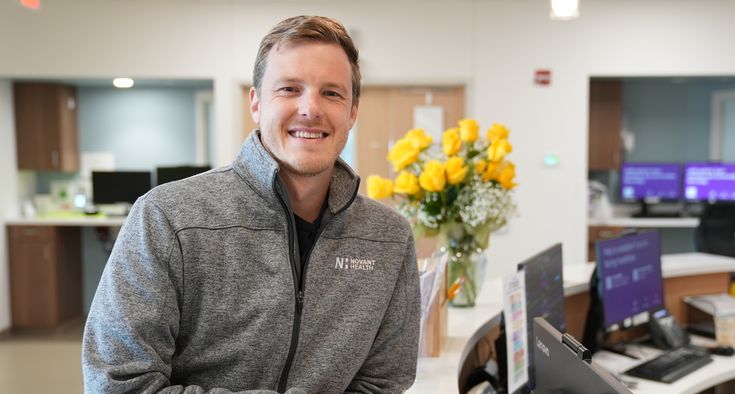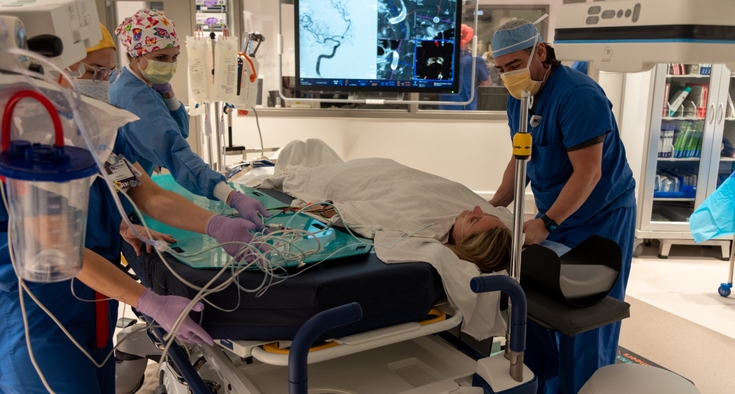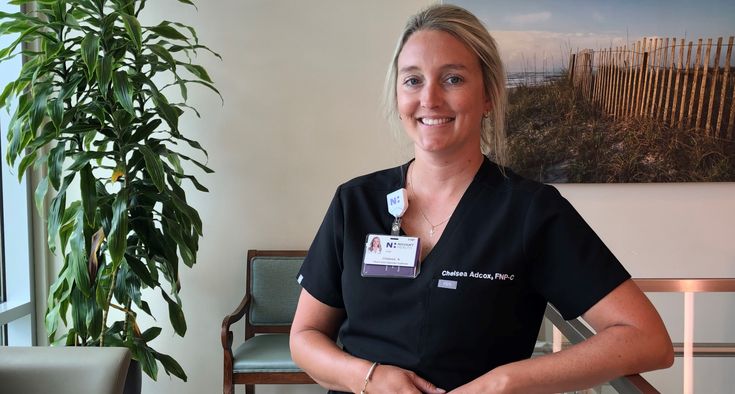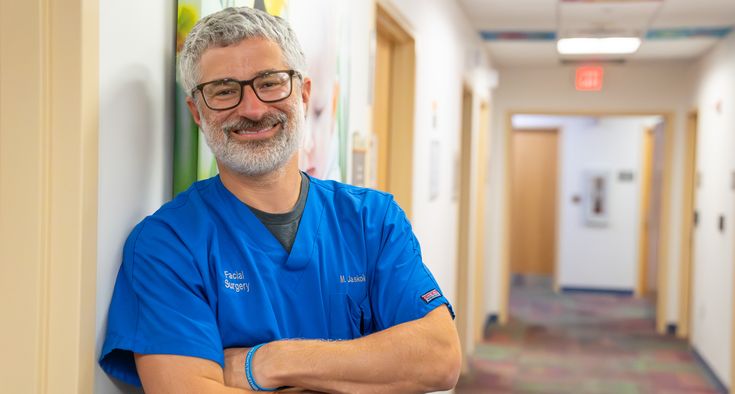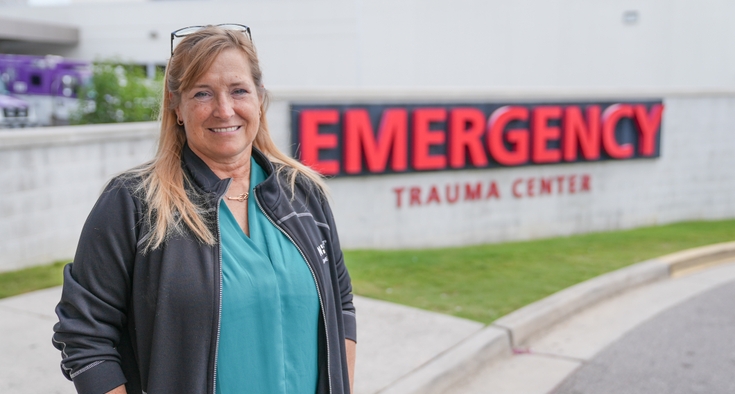In the neurocritical care unit at Novant Health New Hanover Regional Medical Center, many patients can’t speak for themselves — their voices quieted from the effects of a stroke, or because they’re intubated and sedated. But that doesn’t mean they go unheard.
Patients in the neuro ICU or neuro intermediate critical care unit – sometimes referred to as a “step-down” unit – at Novant Health New Hanover Regional Medical Center, are in good hands. They’re being cared for by nurses trained to look for subtle, nonverbal signals people may be sending without even being aware. (And also by neurointensivists with specialty training; see this companion story about them.)
These nurses are on Dakota Haraldson’s team. He’s the registered nurse who manages both units, and he and his team – about 35 in the neuro ICU and about 70 in in the neuro intermediate critical care unit – are experts at picking up on tiny nonverbal cues. The body often finds other ways to communicate.
“If a (nonverbal) patient whose blood pressure has been normal all day has a reading that’s 10 or 15 points higher than it has been,” Haraldson said, “it could mean that patient is in pain and trying to tell us through their vital signs.”
Nurses in both units go the extra mile to get to know their patients. Even if – maybe especially if – those patients can’t vocalize.
Nationally recognized neurological care.
A “get-to-know-me” board in every room helps the staff understand the human in the hospital bed. That board includes the patient’s hobbies, favorite thing to eat, pets and other items of interest. Family members, friends – whoever’s in that patient’s support network – can help the staff know their loved one by sharing those details.
“By getting to know a patient’s support system, we really do get a sense of who that patient is,” he said. “We want it to be more than superficial. For instance, we already know their legal name, but we always ask what they like to be called.”
And then they use that name, which is more than a nicety. There’s a medical reason for it. If your legal name is Patricia but everyone calls you Patty, Haraldson explained, you may not respond the same way if the care team calls you Patricia.
‘Subtle warrants investigation’
The nursing team has to be very attuned to patients’ responses.
“It's all about the trend,” said Haraldson. Nurses in both units are looking not just at how a patient is doing right now, but how that compares with how they were an hour ago.
“When looking at an exam, you consider: What’s their motor function? What’s their level of consciousness? You look at a head-to-toe assessment and monitor those trends while looking for any deviation, meaning: Did the exam worsen? Or did it get better?
“If a patient answered all our questions appropriately and now can’t … or if there’s suddenly a slight weakness on their left side that wasn’t there before, what picture is that painting? Nurses in both units look for those little changes and then escalate to a neurologist.”
And those changes can be minuscule. If you weren’t trained to look, you might miss them.
“Let’s say a patient was alert and oriented an hour ago,” he said. “They knew who they are, where they are, why they’re here and their speech was clear. But now, there’s a slight facial droop. They’re still answering all the questions appropriately, though. That’s something I’d alert a provider to – immediately. It may be just a subtle change, but in our department, subtle warrants further investigation.”
Even a slight change in grip strength can indicate a problem. There’s really no change too small for a nurse to notice and alert a doctor to. “Evidence-based practice helps drive the care we give,” Haraldson said. “From a bedside perspective, the most important thing we do is monitor our patients frequently.”
Quick, but careful
That takes training – and a certain kind of person.
When hiring nurses to work in either unit, Haraldson looks for people who stay calm under pressure. “You have to stay composed during those moments of chaos,” he said. “You need to be able to make clear judgments, which you can’t do if you’re in a panic.”
Other qualities Haraldson looks for are the ability to think critically and make decisions quickly. Nurses must be able to communicate clearly, even in high-pressure instances. And lastly, they must be compassionate.
“They need to see that the person in the bed is more than just a patient, but a human,” Haraldson said. “They should see them for the person they were before the event that led them to be in that bed.”
Nurses who work in these units have specialty training. Some already have that training before they are hired; others receive it through Novant Health’s nurse residency program.
“The residents learn first and then apply what they’ve learned in a controlled setting, where someone experienced is helping them,” Haraldson explained. “Since we’re a comprehensive stroke center, we’re a great place to learn about neurologic care – especially intensive care.”
Haraldson already had specialty training when he came to New Hanover Regional Medical Center in 2022. That was a homecoming for him; he was born and raised in Wilmington but spent nearly a decade away. He began his career as a trauma nurse in an ICU in New Hampshire. The hospital where he worked didn’t have a neuro ICU at the time – but was building one.
When the neuro ICU opened, he began working there, as well, and divided his time between the two ICUs. That was good training for managing two ICUs, as he does now.
Haraldson began at New Hanover Regional Medical Center in neuro interventional radiology. Unbeknownst to him, the neuro ICU was in development, part of the sophisticated new neurosciences institute that opened in 2023.
“So, I was in the right place at the right time. I got to be part of helping open a new unit – twice,” Haraldson said. “I consider myself very lucky.”
He got lucky again when the assistant manager position for the neuro ICU suddenly opened. “I hadn’t had a goal of going into nursing leadership until the right opportunity found me,” he said. After nearly two years in that job, the nurse manager position opened and he applied. He started in October 2024.
He’s felt supported – by doctors, including Dr. Amanda Pardon and Dr. Jafar Hashem; the nurses he leads; and the entire team – in every new challenge he’s accepted. “Being newer to leadership, I couldn't have done it without this team,” he said. “I'm very proud of what we've created here and what we continue to build upon. If you have the right team in place, anything's possible.”
An RN with an MBA
Haraldson is at patients’ bedsides less often now. He misses that but relishes the opportunity to support the nurses who report to him.
“A lot of them are looking to grow within the profession,” he said. “It’s awesome when I get to have conversations with nurses who want to go for a certain credential or go back to school. I love supporting them in that.”
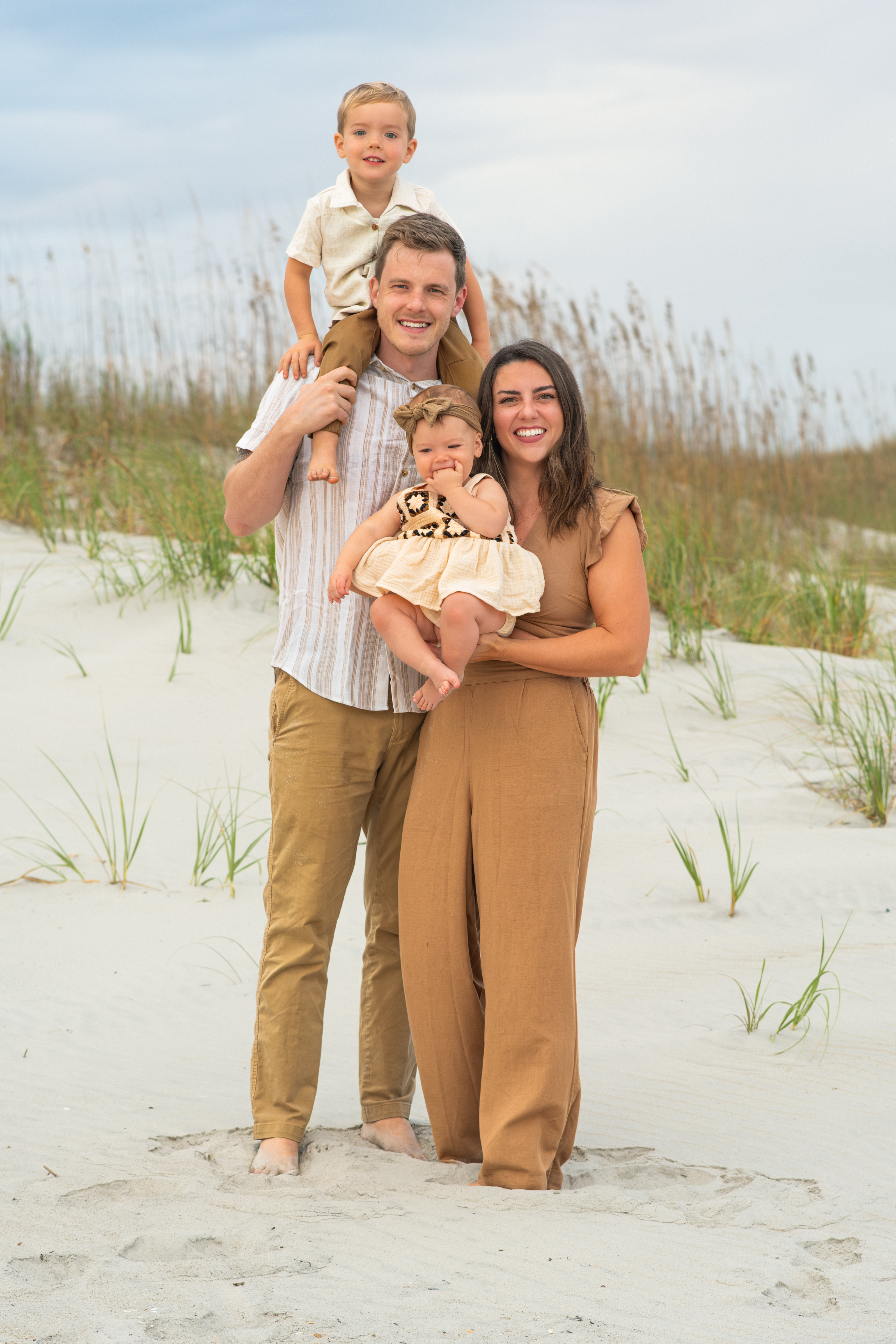
Haraldson can appreciate that desire to continue advancing. While in the assistant nurse manager role, he decided to pursue an MBA. He recently completed his degree, and credits his wife, Bekkah, with supporting him and making sure he had time to complete his coursework and study, a huge feat while still working full time and raising two children, ages 1 and 3.
Family is a top priority for Haraldson; it’s what keeps him grounded, he said. “I love spending time with my wife and kids – at the beach, or really anywhere, doing anything, as long as we’re together.”
The ICU is an intense place to work, so downtime is crucial. He encourages everyone on his team to have “that thing” they do outside work to find joy. His is family time.
“When I lived in New Hampshire, it was snowboarding at Killington – a great escape,” he said.
Every escape helps Haraldson be fully present for the team and patients depending on him. And he wants the very best for all of them.
“Our goal, for every patient admitted to either unit, is to get them back home the way they came in,” he said. “We want them to have the same functional status or as close as possible to the functional status they came in with. We work hard to get them there.
“I would never hope for someone to end up here,” he concluded. “But if you do, I promise: We’re going to take excellent care of you.”





